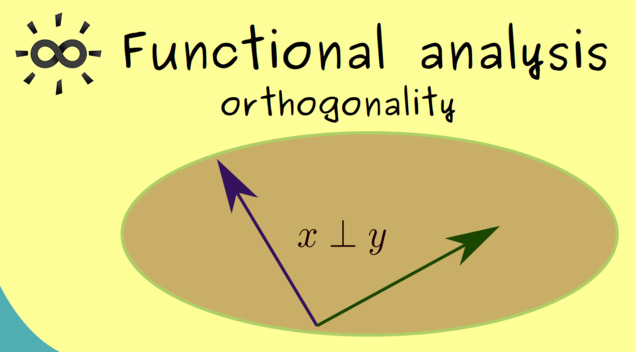
-
Title: Orthogonality
-
Series: Functional Analysis
-
YouTube-Title: Functional Analysis 11 | Orthogonality
-
Bright video: https://youtu.be/9s9jov5cvy0
-
Dark video: https://youtu.be/1en7nSfgRjo
-
Ad-free video: Watch Vimeo video
-
Quiz: Test your knowledge
-
Dark-PDF: Download PDF version of the dark video
-
Print-PDF: Download printable PDF version
-
Thumbnail (bright): Download PNG
-
Thumbnail (dark): Download PNG
-
Subtitle on GitHub: fa11_sub_eng.srt missing
-
Timestamps
00:00 Introduction
00:20 Definitions
01:58 Remark
03:43 Visualisations
04:58 Credits
-
Subtitle in English (n/a)
-
Quiz Content
Q1: Let $(X, \langle \cdot, \cdot \rangle)$ be an inner product space with $x,y \in X$. What is not correct in general?
A1: If $x = 0$, then $x \perp y$.
A2: If $x \perp y$, then $x$ and $y$ are orthogonal.
A3: If $x \perp x$, then $x = 0$.
A4: If $x - y \perp x$, then $x = 0$.
Q2: Let $(X, \langle \cdot, \cdot \rangle)$ be an inner product space with $x \in X$ and $U, V \subseteq X$. What is not correct in general?
A1: If $x = 0$, then ${x}^\perp = X$.
A2: If $x \perp y$ for all $y \in U$, then ${x} = U^\perp$.
A3: If $U \subseteq V$ then $U^\perp \supseteq V^\perp$.
A4: $U^\perp$ is always a subspace in $X$.
Q3: Let $(\mathbb{C}^n, \langle \cdot, \cdot \rangle)$ be the inner product space with the standard inner product. Are $\binom{i}{1}$ and $\binom{-i}{1}$ orthogonal?
A1: Yes!
A2: No!
-
Last update: 2024-10